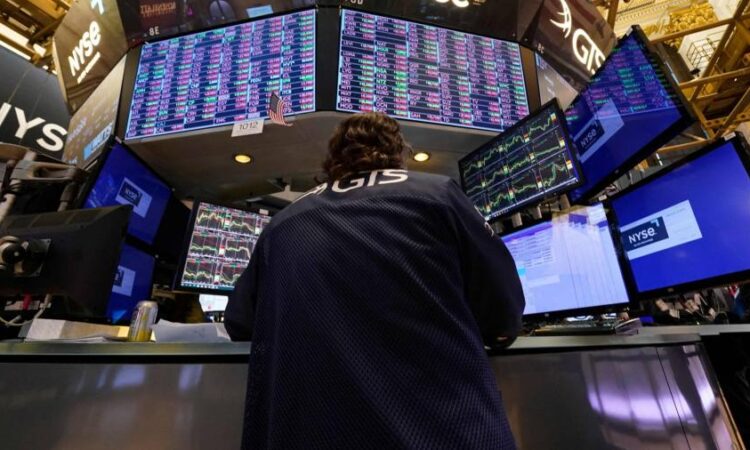
US bank stocks rose at the open on Monday as investors looked past the measures to shore up the banking system to focus on the Federal Reserve’s upcoming decision on US interest rates.
The KBW Nasdaq Bank index rose 3.2 per cent at the open in the US, with heavyweights such as JPMorgan Chase and Citigroup up 2.2 per cent and 2.6 per cent respectively. However, First Republic, the lender at the centre of last week’s concerns, was down 12.8 per cent.
The gains were mirrored in Europe, where the Euro Stoxx bank index rose 1 per cent, as many of the region’s biggest names recovered from early declines. UBS erased losses of more than 14 per cent as investors weighed its takeover of Credit Suisse, to trade as much as 6.1 per cent higher.
However, Société Générale was down 1.1 per cent and shares in Credit Suisse dropped 49 per cent as its shareholders faced a heavy writedown in value from the UBS takeover.
But the wider benchmark indices moved higher. The blue-chip S&P 500 rose 0.4 per cent, although the tech-heavy Nasdaq lost 0.2 per cent. In Europe, the Stoxx 600 index rose 0.9 per cent while the FTSE 100 was up 0.6 per cent and the Cac 40 in Paris added 1.4 per cent.
“The [Credit Suisse/UBS] deal at the margin reduced the systemic risk of banks failing,” said Emmanuel Cau, head of European equity strategy at Barclays. He added that there was “little conviction in the market . . . it’s a bounce caused by risk to the banking sector and the economy being reduced”.
Investors’ focus is on the US Federal Reserve’s meeting on Tuesday and Wednesday, in which its latest interest rate decision will be decided. Investors are pricing in a 53 per cent chance of no change, and a 47 per cent chance of a 0.25 percentage point rise.
“Much will depend on whether a modicum of stability returns to financial markets, especially for regional banks,” said analysts at ING. “In an ideal world, the Fed would separate monetary policy (inflation requiring more hikes) and financial stability (liquidity provision to banks). In practice, a hike could aggravate financial stability concerns.”
Goldman Sachs said it expected the outbreak of stress in the banking sector to constrain central banks’ plans to keep raising rates in their long-running battle with inflation.
The investment bank trimmed its eurozone economic growth forecast by 0.3 percentage points and said it expected the European Central Bank to raise rates by a quarter of a point in May. It previously anticipated a half point. It also no longer expected the Bank of England to raise rates in May.

One element of the rapid-fire takeover of Credit Suisse that is fuelling jitters among debt investors is the deal’s wipeout of $17bn of the bank’s bonds.
Swiss regulator Finma demanded on Sunday that SFr16bn ($17bn) of Credit Suisse’s additional tier one (AT1) bonds, a type of bank debt designed to take losses during a crisis, be written down to zero as part of the rescue deal with UBS. The Swiss move cast doubt on the hierarchy of claims in the event of a banking failure. It was the biggest writedown so far of AT1 debt.
“There are two lessons from the Credit Suisse story,” said Charles-Henry Monchau, chief investment officer at Syz Bank. “When you’re a minority shareholder of a systemic bank, your voice doesn’t count at all. And you thought AT1 bonds were senior to equity — you were wrong. It’s a big stress on the market.”
There were heavy declines in Asia, including a 7.1 per cent fall in HSBC shares in Hong Kong. “It is a wake-up call to investors that AT1 bonds carry real risks of being written off in extreme scenarios, which is also the purpose of having such bonds,” said Gary Ng, senior economist at Natixis in Hong Kong. “The move will probably trigger some sell-offs and risk rebalancing from bond investors and wealth management product holders.”
“This is an assessment that a lot of people are doing today — institutions, banks and private bank clients that all hold this,” he added.
The yield on the 10-year US Treasury note rose 0.05 percentage points to 3.44 per cent. The yield on the two-year note rose 0.04 percentage points to 3.88 per cent.
The yield on 10-year German Bunds was flat at 2.12 per cent, and the yield on the two-year note fell 0.1 percentage points to 2.33 per cent.
Asian stocks fell. Japan’s Topix shed 1.5 per cent, while South Korea’s Kospi dropped 0.8 per cent and Hong Kong’s Hang Seng index declined 2.7 per cent.
Brent crude, the international benchmark, and WTI, the US equivalent, fell 0.8 and 1.2 per cent respectively, to their lowest price since December 2021.
Additional reporting by Primrose Riordan in Hong Kong






